
“When I got sober, I thought giving up was saying goodbye to all the fun and all the sparkle, and it turned out to be just the opposite. That’s when the sparkle started for me.”
- Mary Karr
It’s hard to be creative when you’re stressed, isn’t it?
Creativity is a gift. It’s a wonderful way to work through emotions and tell stories. From art and photography to writing and music, there are so many different ways to be creative.
So, when you find yourself facing that block, unable to pick up a pencil, what do you do to alleviate it? Have you ever turned to drinking as the answer?
Here in Arizona nearly 1 in 5 adults binge drink at least once a month. It’s a socially accepted way to have fun and unwind, but is it impacting your creativity? What’s the line between casual alcohol use and an alcohol use disorder? Could you spot the signs of alcoholism if they were right in front of you?
Our team at Recovery Center for the Arts has seen many people walk through our doors wanting to find their passions again. No matter why they started drinking, it got to a point where they didn’t want it anymore. In today’s blog, we’ll talk about the signs of alcoholism, how they impact your ability to pursue your passions, and what you can do if you spot these signs in yourself or a loved one.
Is Alcohol Use Helping or Hurting Your Creative Spirit?
The perceived link between substance and alcohol use to creativity isn’t a recent one. Many people have touted the “benefits” of being under the influence while engaging with art. While an altered state of mind can lead to intriguing results at times, does this process actually benefit your ability to make?
Alcohol is primarily a depressant. This means that when it's in your system, it slows things down. This includes anything from your reaction time to your heart rate. Many people find alcohol to be a way to unwind or a way to let go and have fun. Relaxing and having a good time both seem like things that could be good for your creativity, right?
Here’s the truth: there is a chance that having a drink or being drunk could help your creativity, but this is never a guarantee. In fact, the more frequently you engage in alcohol consumption, the less likely that it’s going to have any positive effect on your motivation and inspiration. Over time, it has the opposite effect.
Alcohol impacts your ability to make decisions. It also worsens your coordination, ability to focus, your vision, and even your memory. All of these abilities are very important for the creative process.
When does it get to this point? Why do so many creative people, especially those who are in the public eye, turn to drinking?
How Can You Know If Your Alcohol Use Has Gone Too Far?
Okay, so maybe you’ve sought out alcohol in the past to help you deal with stress or to loosen up your inhibitions so you could just create something for once. It worked a few times, so you kept doing it. Is there a specific point at which it stops working? Why does it stop working?
The journey from casual alcohol use to an alcohol use disorder (AUD) is different for everyone. There is no set number of drinks or conditions that will always guarantee that someone develops an AUD. Many people are unaware of how far their alcohol use has gotten without some self-reflection.
If you’re unsure if your alcohol use has “gone too far,” ask yourself these questions:
- Have you tried to cut back before but were unable to?
- Do you need to drink more to experience the same results?
- Has your drinking impacted your relationships or finances?
- Have you cut back on or stopped doing activities you like in order to drink more?
- Do you spend most of your day revolving around alcohol? (thinking about it, drinking it, recovering from it)
- When you stop drinking do you experience side effects?
- Have you ever had cravings for alcohol?
- Have you gotten into dangerous situations because of alcohol?
- How often do you drink more or longer than you intend to?
These are all questions that professionals keep in mind when looking into those with an alcohol use disorder. If you answered yes to more than one of these, it might be time to think about what path you want to be on in life.

Recognizing the Signs of Alcoholism and What They Mean for You
The side effects of an alcohol use disorder won’t just pop up overnight. This is what can make them harder to notice, they appear slowly over time. You might get used to the changes without realizing how different your life was last year, or even just a few months ago.
Being aware of what the side effects are, however, can help you spot them. Alcohol use disorders will impact not just your physical health, but your mental health, too. Here are some of the most common signs of an alcohol use disorder.
How Alcohol Use Impacts You Mentally
There are many ways in which alcohol has a lasting impact on your mind. Recognizing the behavioral shifts that come from long-term alcohol use is an important step to being able to address and heal the scars caused by alcohol.
One of the biggest things alcohol impacts is your memory. People who have a history of long-term alcohol use often experience confusion, difficulties concentrating, and trouble remembering both recent and past events.
Depression is also a very common side effect of alcohol use. This comes both from the effect alcohol has on the brain, as well as the circumstances that often arise from alcohol use. The loss of relationships and finances often compounds with the depression already stemming from the changes in your dopamine center.
How Alcohol Use Impacts You Physically
Alcohol is toxic to the body. In the past, it was believed that certain quantities of alcohol, or types of alcohol, were “better” for you than others. In recent years, this has been disproven. This doesn’t mean that having a drink is innately going to kill you, but it does better explain the many physical side effects that can stem from frequent, long-term, and/or heavy alcohol consumption.
When you drink alcohol, it’s processed through your digestive tract, with your liver and kidneys doing the most work. Both of these organs are dedicated to processing and eliminating toxins that come into the body. The more frequently they’re exposed to alcohol, the more likely it is that they’re going to be damaged by it. Liver damage from alcohol use is one of the most common side effects of an alcohol use disorder and is often hard to spot until the damage is severe. Liver damage can lead to infection, jaundice, swelling, weight loss, and more.
Other organs that can be impacted include your heart, pancreas, bones, muscles, lungs, mouth, and intestines. This can lead to irregular heartbeat, increased risk of bone fractures, increased risk of stroke, hypertension, and more. The greatest risk overall is the increased risk of cancer across multiple organs.
The good news is that many of the physical side effects of an alcohol use disorder can be treated and even reversed in many cases with the right timing and proper care.
Can You Treat Your Alcohol Use Disorder at Home?
While alcohol withdrawal can often be addressed at home with minimal risk, healing is best done with the support of others. Do you know the cause behind why you sought out alcohol? Have you found new ways to fill the empty time that alcohol once took up? Do you have people who you trust who can help you should you get into triggering situations?
These are the things that recovery can help with, as well as much more. Alcohol use disorders are not a failing, but a mental health condition that develops over time. They’re often co-occurring alongside other conditions such as depression or trauma. Just like you wouldn’t try and perform surgery on yourself with the help of a family member who isn’t a doctor, why would you do that with your mental health?
You’re worthy of care and treatment. You deserve the best. There is support out there, and people that understand your needs and want to see you living your best life once more.

The Benefits of an Arizona-Based Alcohol Recovery Program for Creative Souls
If you want to find a way to heal your inner child and step away from alcohol use, then seeking an alcohol rehab program is your best first step. There you will find support along every step of your journey, surrounded by staff and peers who understand your circumstances and will help you see the passions that exist outside of alcohol.
There’s no wrong time to get started. Our team at Recovery Center for the Arts is here for you whenever you’re ready. We offer a wide variety of creative treatments, so you’ll be sure to find something that suits your interests and needs. Give us a call anytime at (480) 386-1593 and we’ll be happy to answer any questions you may have.
Recovery Center for the Arts – Finding recovery through creativity.

